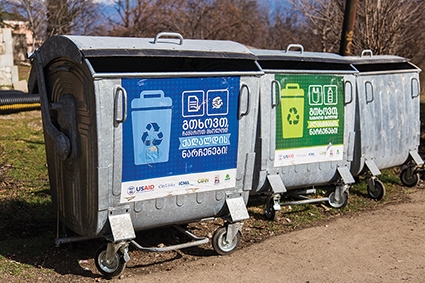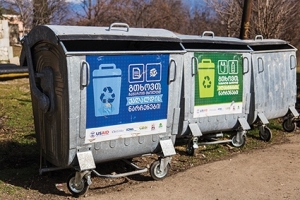Changing Habits: Kakheti Region Begins to Separate Paper and Plastic Waste
Waste bins with stickers that identify ‘only plastic’ and ‘only paper’ have recently appeared in five villages of Telavi Municipality, allowing the population of Tsinandali, Kvemo Khodasheni, Busheti, Vanta, and Akura to start to separately collect paper and plastic in order to fulfill the country’s requirement towards the Waste Management Code, which involves implanting a waste collection system from 2019.
Aiming to create a waste separation and collection system in each of these areas, the pilot project is initiated by the USAID funded program Waste Management Technologies in the Regions (WMTR), which is implemented by the International City/Country Management Association (ICMA) and the Caucasus Environmental NGO Network (CENN).
According to Nino Shavgulidze, the Chief of Party of the Program, the reason the pilot is being implemented in Telavi Municipality was their readiness and desire to be involved in such an initiative. “In December 2014, the municipality addressed us asking for support in the expansion of the waste collection and cleaning services within the municipality,” Shavgulidze explains, adding that the split of the municipality and the creation of a separate self-governed city of Telavi resulted in a division of human and technical resources.
The territory of the newly formed Telavi municipality is 1077,65 km2 and covers 26 villages. Today, all of the villages have a waste collection system operated by Service of Welfare and Infrastructure Ltd. However, as Shavgulidze notes, when the pilot project was planned, only 5 villages had the service.
Zura Enukidze, representative of the Infrastructure Service of Telavi Municipality, stated that the collection fee in Telavi Municipality for physical persons is 0.50 GEL; while by law it is determined according to various factors like type of activity, number of beds, tables and square meters, for instance. Despite being such a small amount, the majority of citizens could not pay the waste fee. And to address the issue, they decided to implement manual recording in villages in order to determine who has paid. Unfortunately, as Enukidze notes, this failed, too. The share of service-related fees collected in the total waste management budget is insignificant and provides almost no economic support.
As Shavgulidze explains, the villages for the pilot project were selected by the readiness and willingness of both population and trustees of the villages to be involved in the process, the existence of active community groups, community-based organizations and NGOs, and the area’s socio-economic situation.
“We bought 75 bins for the pilot project from which each village has fifteen new bins; six are intended for separated waste collection, while the rest are for ordinary waste. The bins are located in the center of the villages, and near shops and public schools in order to be more accessible,” notes Shavgulidze, adding that the waste is collected weekly with a specific truck and is taken to an appropriate warehouse from where it will be collected by a private collection company for recycling.
The progress is slow but noticeable as the population begins to change its habit of not only throwing waste on spontaneous dumpsites but also separating waste. Mzia Mdivnishvili, an inhabitant of Tsinandali village, says she had been collecting old books and waste paper for a long time. “It was a pity to just throw them away in a normal waste bin or burn them. So I kept them until I saw the bins for separated waste,” she explains.
As a follow up of the pilot project, Shavgulidze explains that the WMTR Program is currently working with the City of Telavi to implement a similar separated waste collection pilot project in the city.
Barbara Dzagnidze











